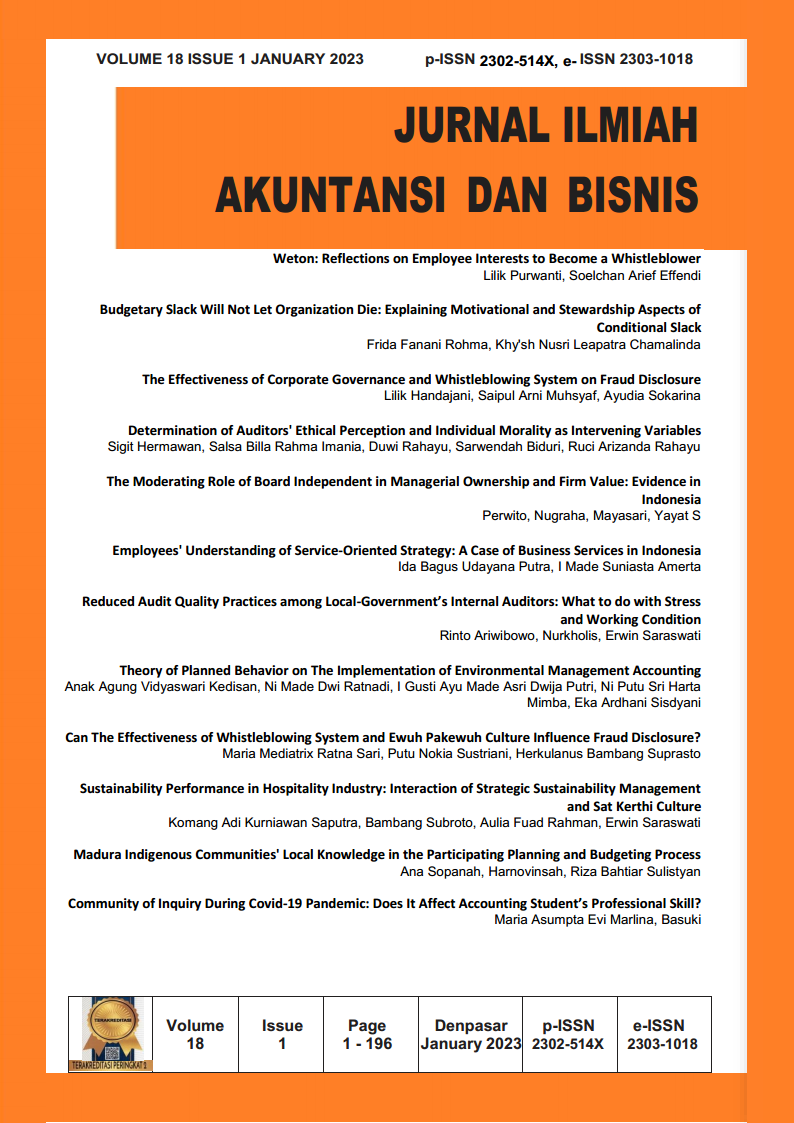Weton: Reflections on Employee Interests to Become a Whistleblower
Abstract
This study aims to reveal the employee's interest in reporting fraudulent acts in the Universitas Brawijaya Academic Business Entity and analyzes the employee's interest based on the weton. Informants include the director, deputy director, financial manager, treasurer, and administrative staff. This qualitative research was conducted through unstructured interviews as well as documentation methods to obtain information about weton from informants. This study found that some employees were interested and some were not. Whistleblowers with weton Rebo Pon, Akad Pahing, Sênin lêgi and Rêbo lêgi consider reporting fraud an obligation and a moral responsibility because it harms the organization. On the other hand, the whistleblowers with weton Kêmis pon and Sêtu kliwon feel uncomfortable, sorry, and afraid to report. The work environment and family form a character that encourages a person's interest in becoming a whistleblower.
Keywords: weton, fraud, employee interest, whistleblower
Downloads
References
Albrecht, W. S., Albrecht, C. O., Albrecht, C. C., & Zimbelman, M. F. (2012). Fraud Examination (Fourth). South-Western Cengage Learning.
Berger, P. G., & Lee, H. (2019). Do Corporate Whistleblower Laws Deter Accounting Fraud? SSRN Electronic Journal. https://doi.org/10.2139/ssrn.3059231
Bhal, K. T., & Dadhich, A. (2011). Impact of Ethical Leadership and Leader–Member Exchange on Whistle Blowing: The Moderating Impact of the Moral Intensity of the Issue. Journal of Business Ethics, 103(3), 485–496. https://doi.org/10.1007/s10551-011-0876-z
Bogdan, R., & Taylor, S. (1992). Pengantar Metode Kualitatif. Usaha Nasional.
Djamal, V. A. Y., Pikir, T. W., & Wardani, R. P. (2019). The Influence of the Characteristics of Whistleblower to Whistleblowing Intentions. Journal of Accounting and Strategic Finance, 2(1), 56–69. https://doi.org/10.33005/jasf.v2i1.47
Dungan, J., Waytz, A., & Young, L. (2015). The psychology of whistleblowing. Current Opinion in Psychology, 6, 129–133. https://doi.org/10.1016/j.copsyc.2015.07.005
Gupta, K. P., & Chaudhary, N. S. (2017). Prioritizing the Factors influencing Whistle Blowing Intentions of Teachers in Higher Education Institutes in India. Procedia Computer Science, 122, 25–32. https://doi.org/10.1016/j.procs.2017.11.337
Karyono. (2013). Forensic Fraud. ANDI.
Kusumadewa, I. M. N. A., Sugiartha, I. N. G., & Widyantara, I. M. M. (2022). Sanksi Pidana terhadap Pelaku Tindak Pidana Penipuan dalam Pencucian Uang Pada PT. Purnama Kertasindo Jakarta Timur. Jurnal Konstruksi Hukum, 3(1), 178–183. https://doi.org/10.22225/jkh.3.1.4417.178-183
LPSK. (2011). Memahami Whistleblower. LPSK.
Miles, M. B., Huberman, A. M., & Saldana, J. (2014). Qualitative Data Analysis, A Methods Sourcebook (3rd ed.). SAGE Publications.
Near, J. P., & Miceli, M. P. (1985). Organizational dissidence: The case of whistle-blowing. Journal of Business Ethics, 4(1), 1–16. https://doi.org/10.1007/BF00382668
Priantara, D. (2013). Fraud Auditing & Investigation. Mitra Wacana Media.
Purwanti, L. (2015). Refleksi Perilaku Pengguna Laporan Keuangan Atas Praktik Manajemen Laba Dalam Perspektif Weton. Jurnal Akuntansi Multiparadigma, 6(3), 362–372. https://doi.org/10.18202/jamal.2015.12.6029
Purwanti, L. (2021). Weton: Penentu Praktik Manajemen Laba. Penerbit Peneleh.
Purwanti, L. (2022). Hesitate Culture: Hampering Employees to Be a Whistleblower. In Proceedings of the Brawijaya International Conference on Economics, Business and Finance 2021 (BICEBF 2021) (Vol. 2, pp. 47–52). Advances in Economics, Business and Management Research, Atlantis Press. http://creativecommons.org/licenses/by-nc/4.0
Ranoewidjojo, R. R. (2009). Primbon Masa Kini: Warisan Nenek Moyang untuk Meraba Masa Depan. Penerbit Bukune.
Rosenau, P. M. (1992). Post-modernism and the social sciences: Insights, inroads, and intrusions. Princeton University Press.
Semendawai, A. ., Susanto, F., Wagiman, W., Omas, B. ., Sulistianingtias, & Wirayawan, S. M. (2011). Memahami Whistleblowing. Lembaga Perlindungan Saksi dan Korban.
Singleton, T. W., Singleton, A. J., Bologna, G. J., & Lindquist, R. J. (2006). Fraud Auditing and Forensic Accounting. John Wiley & Sons, Ltd.
Skalak, S. L., Golden, T. W., Clayton, M. M., & Pill, J. S. (2006). A Guide to Forensic Accounting Investigation. John Wiley & Sons, Ltd.
Sriwinarti, N. K., & Triyuwono, I. (2010). Pemilihan Paradigma Penelitian Akuntansi: Analisis Berdasarkan Pewarigaan dan Kecerdasan Manusia. Jurnal Akuntansi Multiparadigma. https://doi.org/10.18202/jamal.2010.08.7087
Strauss, A., & Corbin, J. (1997). Dasar-Dasar Penelitian Kualitatif Prosedur, Tehnik, dan Teori. Bina Ilmu Ofset.
Triyuwono, I. (2004). The Islamic Perspective on the Construction Of Accounting Discipline. Gadjah Mada International Journal of Business, 6(1), 131. https://doi.org/10.22146/gamaijb.5534
Tuanakotta, T. M. (2012). Akuntansi Forensik & Audit Investigatif (Salemba Em).
Wardani, C. A., & Sulhani, S. (2017). Analisis Faktor-Faktor yang Mempengaruhi Penerapan Whistleblowing System di Indonesia. Jurnal ASET (Akuntansi Riset), 9(1), 29. https://doi.org/10.17509/jaset.v9i1.5255
Wisma, B. . (2009). Tabiat Manusia Menurut Panca Wara dan Sapta Wara. Pusat Parisada Hindu Drama.
Wolfe, D. T., & Hermanson, D. R. (2004). The Fraud Diamond: Considering the Four Elements of Fraud. CPA Journal, 74(2), 38–42.

This work is licensed under a Creative Commons Attribution-NonCommercial-ShareAlike 4.0 International License.




















